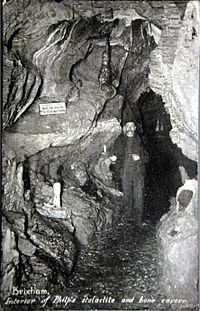Windmill Hill Cavern facts for kids
Quick facts for kids Windmill Hill Cavern |
|
|---|---|
| Windmill Hill Cave, Brixham Cave, Brixham Bone Cavern, Philp's Cave | |

A postcard of the cave from about 1900
|
|
| Location | Beneath 107 Mount Pleasant Road, Brixham |
| OS grid | SX 92457 55983 |
| Length | 96 metres (315 ft) |
| Elevation | 30 metres (98 ft) |
| Discovery | 15 January 1858 |
| Geology | Devonian limestone |
| Entrances | 5, 4 of which are blocked |
| Access | Closed to the public |
Windmill Hill Cavern is a cool limestone cave system found in Brixham, Devon. It's also known by other names like Brixham Cave or Brixham Bone Cavern. This amazing cave was first discovered in 1858. Later, a team led by a geologist named William Pengelly dug it up carefully. They found exciting proof that people lived at the same time as huge, extinct animals in Britain!
Contents
How the Cave Was Found
Windmill Hill Cavern was discovered by accident in 1858. A builder named John Lane Philp was working on a house in Brixham. He was building on Mount Pleasant Road. His pickaxe fell into a hole in the ground. While looking for it, he stumbled upon the cave!
When the Geological Society of London heard about Philp's discovery, they wanted to explore it. They made a plan to dig up the cavern. William Pengelly, a British geologist and expert on ancient life, was chosen to lead the dig. Another geologist, Hugh Falconer, helped plan the exploration.
Digging Up the Past
New Ways to Explore
The team used a special grid system to dig up the cave. This was a brand new way to explore caves at the time. It helped them keep track of where everything was found.
Amazing Discoveries
During the dig, they found 36 ancient tools. These were called Palaeolithic artifacts. The very first one found was a flint knife. Some of these tools were found right next to fossils of animals that are now extinct. This made Pengelly and his team wonder. Could humans have lived alongside these huge, ancient animals?
Proof from the Past
To find proof, they dug even deeper. They also studied flint tools found in another area, the Somme River Valley. This research helped them confirm their idea. They found clear evidence that humans and extinct British animals once lived together.
Animals of the Ancient Cave
The animal remains found in Windmill Hill Cavern were fascinating. They included bones of extinct species. These were animals like the aurochs (a type of wild cattle) and the woolly mammoth. They also found animals that are no longer found in Europe today. One example is the spotted hyena.
The Cave Today
Windmill Hill Cavern was once open to visitors as a "show cave." This means people could go inside and explore it. However, it is now closed to the public. The cavern is a very important historical site. It is protected under a law called the Ancient Monuments and Archaeological Areas Act 1979. This law helps keep important historical places safe.
 | Ernest Everett Just |
 | Mary Jackson |
 | Emmett Chappelle |
 | Marie Maynard Daly |

